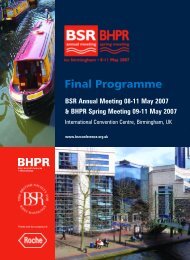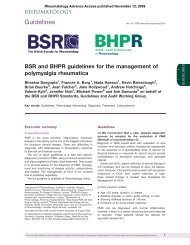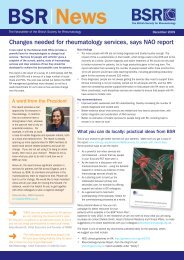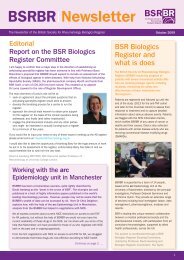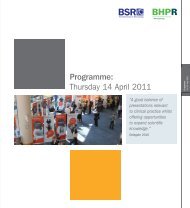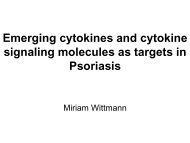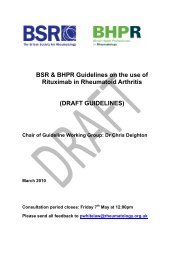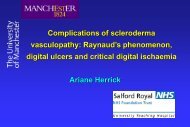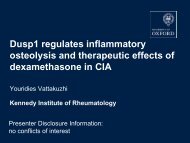Guidelines for the treatment of psoriatic arthritis with biologics
Guidelines for the treatment of psoriatic arthritis with biologics
Guidelines for the treatment of psoriatic arthritis with biologics
You also want an ePaper? Increase the reach of your titles
YUMPU automatically turns print PDFs into web optimized ePapers that Google loves.
Recommendations<br />
• Anti‐TNF <strong>the</strong>rapy should not be initiated or continued in <strong>the</strong> presence <strong>of</strong> serious active<br />
infection, but can be recommenced once <strong>the</strong> infection has resolved clinically. (Grade B). Anti‐<br />
TNF <strong>the</strong>rapy should be used <strong>with</strong> caution in patients at high infection risk after discussing <strong>the</strong><br />
relative risks and benefits. (Grade C). Consensus score 9.8<br />
• Patients on anti‐TNF <strong>the</strong>rapy should be in<strong>for</strong>med <strong>of</strong> appropriate food hygiene. Patients<br />
should also be advised to avoid eating food which contains unpasteurised milk, uncooked<br />
eggs or raw meat. (Grade C). Consensus score 8.8.<br />
• There should be a high index <strong>of</strong> suspicion <strong>for</strong> <strong>the</strong> possibility <strong>of</strong> atypical or opportunistic<br />
infections, and <strong>treatment</strong> should be stopped and advice sought in suspected cases. (Grade B)<br />
Consensus score 9.7.<br />
Tuberculosis<br />
There is a well‐established risk <strong>of</strong> tuberculosis (TB) associated <strong>with</strong> anti‐TNF <strong>the</strong>rapies that has been<br />
documented in many registries. Particularly high rates <strong>of</strong> TB are seen in countries <strong>with</strong> a high rate <strong>of</strong> latent TB<br />
infection, <strong>with</strong> lower rates seen in <strong>the</strong> UK. Data from <strong>the</strong> BSRBR and o<strong>the</strong>r registries has shown a higher risk <strong>of</strong><br />
latent TB reactivation <strong>with</strong> <strong>the</strong> monoclonal antibody anti‐TNF drugs (adalimumab and infliximab) when<br />
compared <strong>with</strong> etanercept [43]. Less data is available <strong>for</strong> certolizumab and golimumab. The efficacy <strong>of</strong><br />
screening <strong>for</strong> TB <strong>the</strong>rapy has been demonstrated by <strong>the</strong> Spanish registry which showed a decrease in cases <strong>of</strong><br />
TB reactivation <strong>of</strong> 78% following <strong>the</strong> introduction <strong>of</strong> routine screening prior to anti‐TNF use [44]. Screening<br />
guidelines are available from <strong>the</strong> British Thoracic Society[45].<br />
Recommendations<br />
• Prior to starting <strong>treatment</strong> <strong>with</strong> anti‐TNF <strong>the</strong>rapy all patients should be screened <strong>for</strong><br />
mycobacterial infection in accordance <strong>with</strong> <strong>the</strong> latest National guidelines. Active<br />
mycobacterial infection should be adequately treated be<strong>for</strong>e anti‐TNF <strong>the</strong>rapy is started.<br />
Prior to starting anti‐TNF <strong>the</strong>rapy, consideration <strong>of</strong> prophylactic anti‐TB <strong>the</strong>rapy (as directed<br />
by <strong>the</strong> latest National guidelines) should be given to patients <strong>with</strong> evidence <strong>of</strong> potential latent<br />
disease. (Grade B). Physicians should be vigilant <strong>for</strong> <strong>the</strong> development <strong>of</strong> mycobacterial<br />
infections throughout <strong>treatment</strong> <strong>with</strong> anti‐TNF and <strong>for</strong> at least six months after<br />
discontinuation. (Grade C). If patients develop evidence <strong>of</strong> mycobacterial infection whilst on<br />
anti‐TNF <strong>the</strong>rapy <strong>the</strong>y should receive a full course <strong>of</strong> anti‐mycobacterial chemo<strong>the</strong>rapy – <strong>the</strong><br />
anti‐TNF <strong>the</strong>rapy may be continued during this time if clinically indicated (Grade C).<br />
Consensus score 9.4<br />
HEPATITIS B<br />
Elevated levels <strong>of</strong> TNF are seen in patients <strong>with</strong> chronic hepatitis B virus (HBV). TNF may play a role in clearing<br />
HBV leading to <strong>the</strong> possibility that anti‐ TNF may enhance viral replication. In animal models TNF promotes<br />
viral clearance <strong>of</strong> HBV [46]. HBV can be considered in subcategories as below, <strong>with</strong> each pr<strong>of</strong>ile carrying<br />
differing risk ratios <strong>for</strong> reactivation <strong>with</strong> immunosuppressive <strong>treatment</strong>.<br />
• Vaccinated; HBsAg –ve, anti‐HBc –ve, anti‐HBs +ve<br />
11



